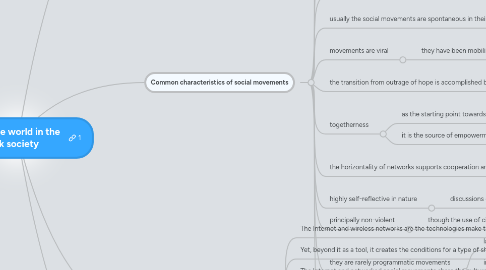
1. Social movements are often triggered by emotions
1.1. anger increases the perception of an unjust action and the whose responsible
1.2. fear triggers anxiety --> avoidance of danger
1.3. fear is overcome by sharing and identifying with others through communicative actions
1.4. anger takes over --> risk-taking behaviour
1.5. when the process of communicative action induces collective actions and change is enacted --> enthusiasm takes over
1.6. enthusiastic networked individuals, having overcome fear, are transformed into conscious collective actors
2. Common characteristics of social movements
2.1. they are networked in multiple forms
2.1.1. active online and offline
2.1.2. networking on the Internet: because they are a network of networks, they can afford not to have an identifiable centre, and yet ensure coordination functions, as well as deliberation, by interaction between multiple nodes
2.1.3. networking as the movement's way of life protects the movement both against its adversaries and against its own internal dangers of bureaucratisation and manipulation
2.2. they become a movement by occupying the urban space
2.2.1. the space of the movement is an interaction between the physical presence on the ground and the wireless/Internet presence in the same place
2.2.2. --> hybrid: space of autonomy --> autonomy can only be insured by the capacity to organise in the free space of communication netowrks, but at the same time can only be exercised as a transformative force by challenging the disciplinary institutional order by reclaiming the space of the city for its citizens
2.3. movements are global and local at the same time
2.3.1. local in that they are often specific and organised in urban spaces
2.3.2. global because they tend to be part of a global debate online, and can call for demonstrations throughout the world in local space at the same time
2.4. timeless time
2.4.1. "they live in the moment in terms of their experience, and they project their time in the future of history-making in terms of their anticipation"
2.5. usually the social movements are spontaneous in their origin, usually triggered by a spark of indignation
2.5.1. a specific event
2.5.2. a peak in condemnation of the policies of the ruling elite
2.6. movements are viral
2.6.1. they have been mobilising people everywhere around, for they trigger the hope in the possibility of change
2.7. the transition from outrage of hope is accomplished by deliberation in the space of autonomy
2.7.1. assemblies are set up for decision making
2.7.2. potential leaders within the movement are discarded, for spreading the deeply-ingrained distrust of the political leadership
2.8. togetherness
2.8.1. as the starting point towards community
2.8.2. it is the source of empowerment
2.9. the horizontality of networks supports cooperation and solidarity while undermining the need for formal leadership
2.9.1. leaderlessness might seem ineffective - it is a principle
2.9.2. the goal does not justify the means, and, the means embody the goals of transformation
2.10. highly self-reflective in nature
2.10.1. discussions online and at assemblies about the movement
2.11. principally non-violent
2.11.1. though the use of civil obedience, like occupying public space, to pressure politics
2.12. they are rarely programmatic movements
2.12.1. lack the ability to formalise specific goals
2.12.2. individuals/groups within the movement have their own aims
2.12.3. aimed at changing the values of society
2.13. they are very political in a fundamental sense
2.13.1. the social movements propose and practice direct democracy based on networked democracy
2.13.2. they are building their own utopia: "when societies fail in managing their structural crises by the existing institutions, change can only take place out of the system by a transformation of power relations that starts in people's minds and develops in the form of the networks build by the projects of new actors constituting themselves as the subjects of the new history in the making"
